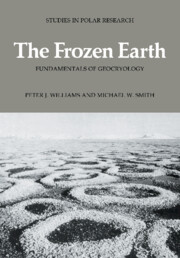Book contents
- Frontmatter
- Contents
- Symbols
- Preface
- Acknowledgements
- 1 PERIGLACIAL CONDITIONS
- 2 MORPHOLOGY OF PERMAFROST AND SEASONALLY FROZEN GROUND
- 3 CLIMATE AND FROZEN GROUND
- 4 THE GROUND THERMAL REGIME
- 5 THE FORMS OF THE GROUND SURFACE 1: SLOPES AND SUBSIDENCES
- 6 THE FORMS OF THE GROUND SURFACE 2: STRUCTURES AND MICROTOPOGRAPHY OF LEVEL GROUND
- 7 THERMODYNAMIC BEHAVIOUR OF FROZEN SOILS
- 8 HYDROLOGY OF FROZEN GROUND
- 9 THE MECHANICS OF FROZEN GROUND
- 10 GEOCRYOLOGY PAST AND FUTURE
- References
- Index
Preface
Published online by Cambridge University Press: 24 October 2009
- Frontmatter
- Contents
- Symbols
- Preface
- Acknowledgements
- 1 PERIGLACIAL CONDITIONS
- 2 MORPHOLOGY OF PERMAFROST AND SEASONALLY FROZEN GROUND
- 3 CLIMATE AND FROZEN GROUND
- 4 THE GROUND THERMAL REGIME
- 5 THE FORMS OF THE GROUND SURFACE 1: SLOPES AND SUBSIDENCES
- 6 THE FORMS OF THE GROUND SURFACE 2: STRUCTURES AND MICROTOPOGRAPHY OF LEVEL GROUND
- 7 THERMODYNAMIC BEHAVIOUR OF FROZEN SOILS
- 8 HYDROLOGY OF FROZEN GROUND
- 9 THE MECHANICS OF FROZEN GROUND
- 10 GEOCRYOLOGY PAST AND FUTURE
- References
- Index
Summary
Activities in the cold regions of the earth have expanded greatly in recent decades, largely as a result of interest in natural resources (especially oil, gas and minerals), creating a demand for knowledge of the special natural conditions found there. Over this period there have been improvements in geotechnical engineering and a greater scientific understanding of the effects of freezing and thawing upon earth materials. The benefits of this have also extended to regions which experience significant seasonal freezing and thawing. While there are several texts which describe the terrain features of the cold regions, as well as a large technical literature in the form of research papers and conference proceedings, there appeared to be a need for a textbook which integrated the various approaches inherent in our contemporary understanding of the frozen earth.
Much of our knowledge of geocryology is recent, and has been built upon the extensive work of field scientists, as well as the work of geotechnical engineers. As practical needs have become more pressing, the work of laboratory and theoretical scientists–applying the principles of physical chemistry and thermodynamics–has been of fundamental importance. The challenge of this book was to combine and integrate these, and indeed other perspectives into an effective synthesis, one which could provide students and professionals alike with the basic knowledge appropriate to the study of the unique terrain and geotechnical conditions in cold climates.
- Type
- Chapter
- Information
- The Frozen EarthFundamentals of Geocryology, pp. xv - xviPublisher: Cambridge University PressPrint publication year: 1989

